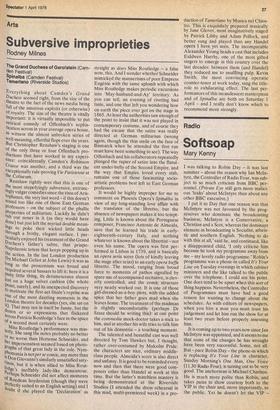Arts
Subversive improprieties
Rodney Mimes
The Grand Duchess of Gero!stein (Camden Festival)
Spinalba (Camden Festival) Temeriano (Riverside Studios)
Everything about Camden's Grand Duchess seemed right, from the size of the theatre to the fact of the news media being full of the amorous exploits (or otherwise) Of royalty. The size of the theatre is vitally IMportant: it is virtually impossible to put satirical comedy of Offenbach's sophistication across in your average opera house, as witness the almost unbroken series of Well-meaning, effortful flops over the years. But Christopher Renshaw's staging is one of the only three or four Offenbach productions that have worked in my experience: coincidentally Camden's Robinson Crusoe was another, and a third was the exceptionally rule-proving Vie Paris ienne at the Coliseum.
Renshaw rightly sees that this is one of the most stupefyingly subversive, entrancingly vulgar comedies since the time of Aristophanes, the very last word if this doesn't sound too like one of those East German Professors on the subject of the phallic • Properties of militarism. Luckily he didn't rub our noses in it (as they would have done) but just left the myriad double meanings to poke their wicked little heads through a frothy, elegant surface. I particularly enjoyed his treatment of the Grand Duchess's father's sabre, that priapoNapoleonic totem that keeps popping up in the action. In the last London production (by Michael Geliot at John Lewis) it was as king as the proscenium was broad and required several hussars to lift it; here it is a Pony little thing, its detumescence almost lost on a huge velvet cushion (the whole. Point, surely), and its unexpected discovery to motivate the first-act finale's reprise was one of the most dazzling moments in the l-ondon theatre for decades (yes, she sat on It). That may not in itself be funny, but the dozen or so expressions that flickered across Patricia Routledge's face in the space el a second most certainly were. Miss Routledge's performance was masterly. She sang the notes probably no better
or no worse than Hortense Schneider, and her impersonation seemed based on photographs of that great lady in the role. Nym
Phomania is notper se comic, any more than Don Giovanni's similarly unsatisfied satyriasis, but it is when allied to Miss Rout 1,edge's ineffably lady-like demeanour.
erhaps Schneider did not affect moments Of Roedean hoydenism (though they were perfectly suited to an English setting) and I doubt if she played the 'Declaration' as
straight as does Miss Routledge a false note, this. And I wonder whether Schneider mimicked the mannerisms of poor Empress Eugenie with the same aplomb with which Miss Routledge makes periodic excursions into 'May-husband-and-Ay' territory. As you can tell, an evening of riveting bad taste, and one that left you wondering how on earth the piece ever got on the stage in 1865. At least the authorities saw enough of the point to insist that it was not played in contemporary costume, and of course they had the excuse that the satire was really directed at German militarism (wrong again, though the thin smile on the face of Bismarck when he attended the first run must have been something to see). The way Offenbach and his collaborators repeatedly plunged the rapier of satire into the flatulent under-belly of the Second Empire, and the way that Empire loved every stab, remains one of those fascinating socioartistic problems best left to East German professors. It would be highly improper for me to comment on Phoenix Opera's Spinalba in view of my long-standing love affair with the translator of the libretto, but the absence of newspapers makes it too tempting. Little is known about the Portuguese composer, Francisco Antonio de Almeida, save that he learned his trade in earlyeighteenth-century Italy, and nothing whatever is known about the librettist -not even his name. The opera was first performed in Lisbon in 1739, and is basically an opera seria score (lots of kindly leaving the stage after arias) to an early opera buffa libretto. The mood, ranging from broad farce to moments of pathos signalled by spare use of accompanied recitative, is cleverly controlled, and the comic structure very neatly worked out. It is one of those girl-dressed-as-a-boy plots, with the added spice that her father goes mad when she leaves home. The treatment of the madman is slightly uncomfortable (perhaps Dr Szasz should be writing this): at one point the commedia mock-doctor takes a stick to him, and at another his wife tries to talk him out of his dementia a touching moment.
The talented and beautiful cast was well directed by Tom Hawkes but, I thought, rather over-costumed by Malcolm Pride: the characters are nice, ordinary middleclass people. Almeida's score is also direct and unfussy. It is good to be reminded every now and then that there were good composers other than Handel at work at this time. But the latter's matchless mastery is being demonstrated at the Riverside Studios (I attended the dress rehearsal in this mad, multi-premiered week) in a pro duction of Tamerlano by Musica nel Chiostro. This is exquisitely prepared musically by Jane Glover, most imaginatively staged by Patrick Libby and Adam Pollock, and better sung and played than any Handel opera I have yet seen. The incomparable Alexander Young heads a cast that includes Eiddwen Harrhy, one of the most gifted singers to emerge in this country over the last decades: between them (and Handel) they reduced me to snuffling pulp. Kevin Smith, the most convincing operatic counter-tenor at work today, sang the titlerole to exhilarating effect. The last performances of this incandescent masterpiece and of Spinalba are both on Saturday 1 April and I really don't know which to recommend more strongly.


































 Previous page
Previous page